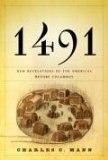Summary | Excerpt | Reading Guide | Reviews | Beyond the Book | Readalikes | Genres & Themes | Author Bio

Critics' Opinion:
Readers' Opinion:
First Published:
Aug 2005, 480 pages
Paperback:
Oct 2006, 528 pages
 Book Reviewed by:
Book Reviewed by:
BookBrowse Review Team
Buy This Book
Why Billington Survived
The Friendly Indian
On March 22, 1621, an official Native American delegation walked through
what is now southern New England to negotiate with a group of foreigners
who had taken over a recently deserted Indian settlement. At the head of
the party was an uneasy triumvirate: Massasoit, the sachem
(political-military leader) of the Wampanoag confederation, a loose
coalition of several dozen villages that controlled most of what is now
southeastern Massachusetts; Samoset, sachem of an allied group to the
north; and Tisquantum, a distrusted captive, whom Massasoit had
reluctantly brought along as an interpreter.
Massasoit was an adroit politician, but the dilemma he faced would have
tested Machiavelli. About five years before, most of his subjects had
fallen before a terrible calamity. Whole villages had been
depopulated—indeed, the foreigners ahead now occupied one of the empty
sites. It was all he could do to hold together the remnants of his
people. Adding to his problems, the disaster had not touched the
Wampanoag's longtime enemies, the Narragansett alliance to the west.
Soon, Massasoit feared, they would take advantage of the Wampanoag's
weakness and overrun them.
Desperate threats require desperate countermeasures. In a gamble,
Massasoit intended to abandon, even reverse, a long-standing policy.
Europeans had been visiting New England for at least a century. Shorter
than the natives, oddly dressed, and often unbearably dirty, the pallid
foreigners had peculiar blue eyes that peeped out of the masks of
bristly, animal-like hair that encased their faces. They were
irritatingly garrulous, prone to fits of chicanery, and often
surprisingly incompetent at what seemed to Indians like basic tasks. But
they also made useful and beautiful goods—copper kettles, glittering
colored glass, and steel knives and hatchets—unlike anything else in New
England. Moreover, they would exchange these valuable items for cheap
furs of the sort used by Indians as blankets. It was like happening upon
a dingy kiosk that would swap fancy electronic goods for customers' used
socks—almost anyone would be willing to overlook the shopkeeper's
peculiarities.
Over time, the Wampanoag, like other native societies in coastal New
England, had learned how to manage the European presence. They
encouraged the exchange of goods, but would only allow their visitors to
stay ashore for brief, carefully controlled excursions. Those who
overstayed their welcome were forcefully reminded of the limited
duration of Indian hospitality. At the same time, the Wampanoag fended
off Indians from the interior, preventing them from trading directly
with the foreigners. In this way the shoreline groups put themselves in
the position of classic middlemen, overseeing both European access to
Indian products and Indian access to European products. Now Massasoit
was visiting a group of British with the intent of changing the rules.
He would permit the newcomers to stay for an unlimited time—provided
that they formally allied with the Wampanoag against the Narragansett.
Tisquantum, the interpreter, had shown up alone at Massasoit's home a
year and a half before. He spoke fluent English, because he had lived
for several years in Britain. But Massasoit didn't trust him. He seems
to have been in Massasoit's eyes a man without anchor, out for himself.
In a conflict, Tisquantum might even side with the foreigners. Massasoit
had kept Tisquantum in a kind of captivity since his arrival, monitoring
his actions closely. And he refused to use him to negotiate with the
colonists until he had another, independent means of communication with
them.
Excerpted from 1491 by Charles C. Mann Copyright © 2005 by Charles C. Mann. Excerpted by permission of Knopf, a division of Random House, Inc. All rights reserved. No part of this excerpt may be reproduced or reprinted without permission in writing from the publisher.





The Funeral Cryer by Wenyan Lu
Debut novelist Wenyan Lu brings us this witty yet profound story about one woman's midlife reawakening in contemporary rural China.
Your guide toexceptional books
BookBrowse seeks out and recommends the best in contemporary fiction and nonfiction—books that not only engage and entertain but also deepen our understanding of ourselves and the world around us.